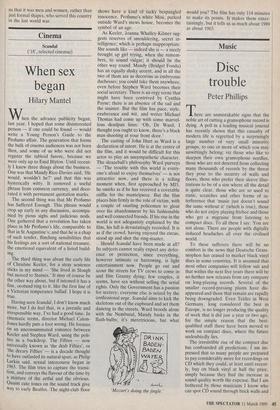Cinema
Scandal ('18', selected cinemas)
When sex began
Hilary Mantel
When the advance publicity began, last year, I hoped that some disinterested person — if one could be found — would write a Young Person's Guide to the Profumo affair. The generation that forms the bulk of cinema audiences was not born then, and some of us who were did not register the tabloid furore, because we were only up to Enid Blyton. Until recent- ly I knew three things about the business. One was that Mandy Rice-Davies said, 'He would, wouldn't he?' and that this was hysterically witty. It removed a useful phrase from common currency, and deco- rated it with permanent quotation marks.
The second thing was that Mr Profumo has Suffered Enough. This phrase would crop up early in any discussion, accompa- nied by pious sighs and judicious nods. One gathered that a revolution has taken place in Mr Profumo's life, comparable to that in St Augustine's; and that he is a chap of such tender, flinching sensibilities that his feelings are a sort of national treasure, the emotional equivalent of a listed build- ing.
The third thing was about the early life of Christine Keeler, for a stray sentence sticks in my mind — 'She lived in Slough but moved to Staines.' It may of course be the other way about, but if intoned it has a fine, orotund ring to it, like the first line of a Victorian temperance ballad. I hope it is true.
Having seen Scandal, I don't know much more, but I do feel that, in a juvenile and irresponsible way, I've had a good time. In cinematic terms, director Michael Caton- Jones hardly puts a foot wrong. He focuses on an unconsummated romance between Keeler and Stephen Ward, using the poli- tics as a backdrop. The Fifties — now universally known as `the drab Fifties', or 'the dreary Fifties' -- is a decade thought to have outlasted its natural span; as Philip Larkin said, sexual intercourse began in 1963. The film tries to capture the transi- tion, and conveys the flavour of the time by a mixture of the artful and the obvious. Quaint cute tones on the sound track give way to early Beatles. The night-club floor
shows have a kind of tacky bespangled innocence. Profumo's white Mini, parked outside Ward's mews house, becomes the symbol of an age.
As Keeler, Joanna Whalley-Kilmer sug- gests reserves of smouldering, secret in- telligence; which is perhaps inappropriate. She sounds like — indeed she is — a nicely brought up girl trying, when she remem- bers, to sound vulgar; it should be the other way round. Mandy (Bridget Fonda) has an equally shaky accent, and in all the two of them are as decorous as embryonic duchesses; you could take them anywhere, even before Stephen Ward becomes their social secretary. There is an orgy scene that might have been contrived by Cynthia Payne; there is an absence of the sad and the sinister. But the film has pace, style, exuberance and wit, and writer Michael Thomas had come up with some marvel- lous deadpan lines: 'Oh, Dr Ward, I thought you ought to know, there's a black man shooting at your front door.'
The casting of John Hurt as Ward is a declaration of intent. He is at the centre of the film, and it would be difficult for this actor to play, an unsympathetic character. The sleazeball's philosophy Ward purveys — 'The trouble with this world is every- one's afraid to enjoy themselves' — is not attractive now, and there is a telling moment when, first approached by MI5, he smirks as if he has received a covetable stiffie for the mantelpiece. But the film places him firmly in the role of victim, with a couple of snarling policemen to gloat over his abandonment by his fashionable and well connected friends. If his rise in the world is not adequately explained by the film, his fall is devastatingly recorded. It is as if the crowd, having enjoyed the circus, stood up and shot the ring-master.
Should Scandal have been made at all? Its subjects cannot really expect any defer- ence or protection, since everything, however intimate or harrowing, is light entertainment now. People go out and scour the streets for TV crews to come in and film Granny dying; few couples, it seems, have sex without selling the serial rights. Only the Government has a passion for secrecy; everyone else is seized by the confessional urge. Scandal aims to kick the skeletons out of the cupboard and set them dancing in the streets. Ward broods alone with the Nembutal, Mandy basks in the flash-bulbs; it's meretricious, but what 'Mozart's doing the jingle.'
would you? The film has only 114 minutes to make its points. It makes them enter- tainingly, but it tells us as much about 1989 as about 1963.


























































 Previous page
Previous page